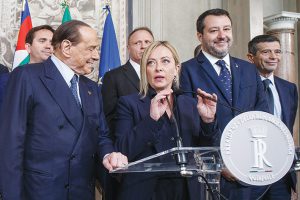Rachel Sanderson
If Giorgia Meloni had expected a straightforward passage to becoming Italy’s first woman prime minister, she hadn’t counted on her coalition ally Silvio Berlusconi’s enduring desire to control. Italy’s three-time premier started undermining her far-right government even before its ministers were named. But Meloni has something to learn from Berlusconi too. He provides a cautionary tale for all populists how quickly their promise of change can turn rancid because of recklessness and corruption.
Berlusconi, who is celebrating 28 years in front-line politics, is the archetype of the modern populist. He is the template for figures from Donald Trump to Boris Johnson, and Meloni herself. He feted his return to Italy’s Senate nine years after having been kicked out for a tax-fraud conviction by assailing Meloni, the new leader of their coalition after the Brothers of Italy party she co-founded won far more votes than Berlusconi or Matteo Salvini’s League last month.
Clearly piqued by his waning political influence, he attacked Meloni personally, describing her as “self-important, bossy, arrogant and ridiculous†in notes to his party loyalists that were leaked to media. He then undercut her authority by cozying up to his old chum Vladimir Putin. In a 48-hour spectacle of self-aggrandizement, he threw into doubt her positioning as a responsible member of the European Union and its pro-Ukraine policy against Putin — and, ultimately, the longevity of her government. By the weekend, when Meloni was heading to President Sergio Mattarella to gain his official go-ahead to form a government, senior bankers told me they were expecting it would last no more than six to nine months.
The sight of 86-year-old Berlusconi, botoxed and perma-tanned, rekindling a bromance with Putin and seeking to assert his will over the 45-year old Meloni has revealed him to be still, unequivocally, unfit for office. But the arc of his extraordinary and appalling political career holds lessons for new leaders.
It’s instructive to remember when Berlusconi burst onto the political stage, his millions of supporters believed his novelty and entrepreneurial chutzpah would reform Italy’s sclerotic economy. Instead, his attention to personal profit for his own business, his corruption and antics, his desire to be loved by the electorate made him unable to tell hard truths and apply his popularity to policy. Ultimately, the promise of Berlusconi died in a bonfire of vanities, and Italy’s economy sank further into decline.
A rundown of Berlusconi’s failures bears retelling as his political offspring populate governments around the world.
His most sensational transgression was the lurid saga of his parties, which made “bunga-bunga†a term of derision heard around the world. Still, the shameful spectacle of a prime minister being put on trial in Milan, sullied not only Berlusconi’s reputation, but Italy’s. Berlusconi’s fraud and tax trials resulted in convictions that were later overturned and then timed out by a statue of limitations on five separate occasions, undermining rule of law in the country which already had a shaky reputation among foreign investors.
But his greatest defect was to do virtually nothing to stem the decline of Italy’s economic competitiveness and growth of its debt load. It’s been left to successive technocratic prime ministers, including most recently Mario Draghi, to try too late to implement reforms. Instead, Berlusconi used his enormous political power and influence to help his private media empire Mediaset, and add to his family’s wealth, by rewriting media and competition laws. The 2004 Gasparri law eased antitrust rules to allow Berlusconi to become the dominant private media owner across TV, print and advertising.
Stunningly, the very same senator behind that bill, Maurizio Gasparri, this month submitted a proposal to amend the civil code that could pave the way for abortions to be classified as murder, a key aim of Meloni’s new right-wing government.
Despite it all, Berlusconi abides. Winning 8% of the vote in last month’s election put him in the position of kingmaker. That’s because it is also true that he created the survival blueprint for the modern populist. A pliant media apparatus helped create the myth of Berlusconi and then helped to maintain in. And old dogs stick with old tricks. It is striking that part of Berlusconi’s argument with Meloni was his desire to have one of his people in the justice ministry – not coincidentally at a time when he faces new trials over corruption.
The other secret of his success is the immovable nativist base that he has tapped. His Forza Italia! (Go, Italy!) party’s vision promised an Italy full of easy economic success, and laissez-faire government where the demonized “other†(in Berlusconi’s case communists and magistrates) was to blame for all Italians’ problems.
—Bloomberg
 The Gulf Time Newspaper One of the finest business newspapers in the UAE brought to you by our professional writers and editors.
The Gulf Time Newspaper One of the finest business newspapers in the UAE brought to you by our professional writers and editors.
